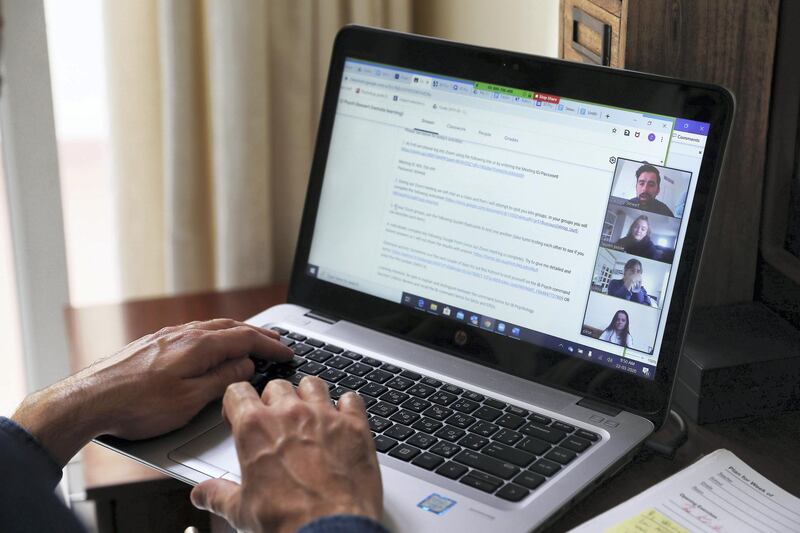Educational institutions in the Middle East are currently closed as part of social distancing measures to stem the spread of the coronavirus but learning does not stop.
Schools, colleges and universities are making use of new e-learning tools and technologies to ensure that studies continue for students at all levels.
"Millions of students across the region are learning from home in the wake of Covid-19 … their ability to do so is the result of quick thinking and collaborative action between the region's private and public sectors," Zubin Chagpar, Middle East and Africa head of public sector at Amazon Web Services, told The National.
The US cloud computing giant has been working with governments and education technology providers to make sure the necessary infrastructure is in place for e-learning courses to continue.
The Middle East e-learning market is expected to grow to a value of more than $1.5 billion (Dh5.5bn) by 2023, growing at a compound rate of 15.2 per cent a year from $558.3 million (Dh2.05 billion) in 2016, according to Research Nester.
The UAE is expected to lead the growth due to the presence of a large number of private schools, almost 65 per cent of the total in the Middle East, the New York-based research company said.
Currently, more than 1.5 billion students worldwide – more than 90 per cent of the total - are stuck at home due to school closures in about 190 countries, according to Unesco estimates.
While education technology platforms have seen demand pick up over the years, the pandemic has increased the load significantly as lessons shift online.
Bahrain’s Ministry of Education and the Information & eGovernment Authority (iGA) restructured its existing EduNet portal over a seven-day period to enhance its capability.
"The nationwide adoption of remote learning meant that it was now required to scale EduNet … to accommodate a larger number of users," Khalid Almutawah, director of governance and enterprise architecture at iGA told The National.
Since the activation of the overhauled portal on March 9, visitor numbers have increased by over 600 per cent. The portal is currently being used by more than 146,000 students and over 18,000 teachers in Bahrain.
Parents can also use the portal to keep a tab on school activities, while school administrators can use it to monitor the progress of students and teachers.
In Jordan, Arabic content publisher Mawdoo3 has established an e-learning platform - Darsak.gov.jo - in collaboration with several entities including Jordan’s Ministry of Education, the Ministry of Digital Economy and Entrepreneurship and AWS.
Jordanian content providers including online video platform Abwaab, e-learning company Jo Academy and non-profit online course provider Edraak have also taken part.
"Built in just a week ... it provides free lessons in Arabic and English for all public school students from grades one through 12," Rami Al Qawasmi, chief executive of Mawdoo3, the largest Arabic-language platform in the world, told The National.

It has received more than 35 million views since it went online on March 22. Lessons are uploaded daily between 6am and 4pm, and cover subjects including Arabic, English, science, mathematics, arts and computers.
Meanwhile, other companies have rapidly rolled out planned e-learning services before their scheduled date and also merged different applications to meet demand.
Microsoft launched a new smart e-learning programme for the UAE Ministry of Education on March 22. It was originally scheduled for a September launch to coincide with the launch of the new academic year, but was brought forward to offset the current disruption.
“The programme aims to enhance safety for students and society at large … as a set of precautionary and preventive measures with the ongoing challenges yet ensuring smooth flow and completion of the curriculums,” the company said in a statement on its blog.
Google, meanwhile, now has more than 100 million students and teachers globally using Classroom – a free web service that aims to help create, distribute and grade assignments in a paperless way.
"To make it easier to have classes remotely, we are integrating Classroom and Meet (a video conferencing app), putting both tools in one place," Tarek Khalil, head of Google Cloud in Middle East and North Africa, told The National.
Using these tools brings greater administrative efficiency, making collaboration and the provision of individual feedback easier, helping teachers to "focus more of their time on coaching and guiding students”, added Mr Khalil.
With 22 million students in 50,000 schools, Egypt – the region's most populous country – has the largest student community in the region.
Teaming up with AWS, its Education Ministry has deployed the Egyptian Knowledge Bank site along with an existing e-learning platform, CDSM Thinqi, opening access for all students in the country.
“These are exceptional times we are living through and the challenges for educational institutions are substantial,” said Nik Goile, head of technology at UK-based Thinqi.
“We were able to scale up our system from two school grades to the entire estate in four days ... it’s been a crazy ride but I am glad that it has been able to do its bit to help people impacted by this global pandemic.”
The UAE-based education technology firm Alef Education is providing free access to its digital learning products to all students in the Emirates, and it is being used by more than 100,000 students from almost 300 schools.
"Our schools may be closed but education must go on," Geoffrey Alphonso, chief executive of Alef Education, told The National.
“Our artificial intelligence-powered platform is designed to help teachers manage their workload and personalise the learning experience [for students].”
The majority, if not all, schools need to implement distance learning as part of their offer “which means we will see a high percentage increase in numbers”, Mr Alphonso said.
To keep a check on the quality of e-learning, the UAE’s Ministry of Education and Dubai, Abu Dhabi and Sharjah's education regulators will be assessing public and private schools this month.
Schools across the country will be inspected to determine how well they are delivering e-learning classes, according to the regulator of Dubai's private schools, the Knowledge and Human Development Authority (KHDA).








